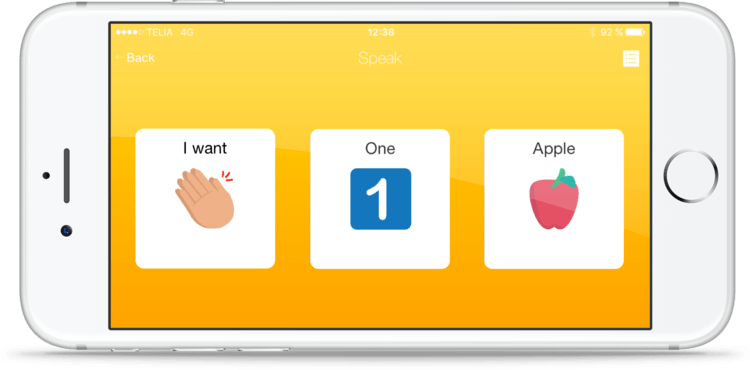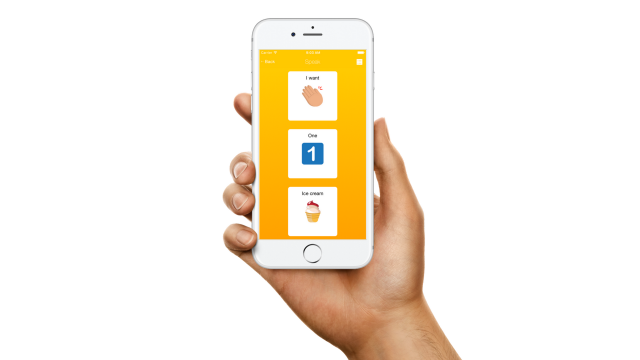Royden James has had the thought before. He’s sure other parents in his situation have, too.
Upcard
“I wish you could just tell me what you want.”
James’ son is six, and has autism. He is nonverbal, so it’s a struggle to know what he wants, needs and thinks about all day. Is he asking for the green spoon or a glass of water? Does he miss certain people or things? What does he wonder about? What does he hope for? Why is he crying? What can a parent do? When will it get better?
“One of the more heartbreaking frustrations is when you can clearly see that your child has something to say to you,” explains James, who lives in Sweden. “Something they want, but the words just don’t come. It’s like you can see in their eyes that they are hoping you can just know.”
While James’ son cannot articulate words, he does have a visual vocabulary — he can use pictures to communicate. James decided to create an app to help him do so. It’s called Upcard, and James says it has been a “life-changer” for his family.
[referenced url=”https://www.lifehacker.com.au/2017/08/what-to-do-if-your-childs-behaviour-is-ruining-your-relationship-with-your-partner/” thumb=”https://i.kinja-img.com/gawker-media/image/upload/t_ku-large/cslkkuohzqini3qzmvfq.jpg” title=”What To Do If Your Child’s Behaviour Is Ruining Your Relationship With Your Partner” excerpt=”‘You know those ABC after-school specials where the parents get divorced, and they tell the kids, ‘It’s not your fault’?’ asks Catherine, a mum of three in Florida. ‘They lied. If we get divorced, it is totally their fault.’”]
Based on the picture exchange communication system (PECS), developed for learners with cognitive, physical and communication challenges, Upcard is made up of “picture cards” that users can place in sequences to form simple statements and requests.
For example: I want + One + Apple.

Upcard
Users can choose from a library of preset picture cards, or add their own from their device’s photo album or camera. For each card, the parent or caregiver can also record themselves speaking the word. That way, the user keeps hearing the same voice, without any subtle changes that people on the spectrum have a hard time adjusting to. Studies have shown that mothers’ voices play a particularly important role in kids’ brain, social and emotional development.
A defining moment for James came one day when he was doing some work in his living room, and his son walked over with his iPad and opened Upcard, which at that stage, was just a barebones prototype.
He put together a sentence with the picture cards: I want + Help + iPad. “I said to him, ‘But you have the iPad and it’s working,’” James says. His son continued to show him the same sentence. I want + Help + iPad. I want + Help + iPad.
“I thought to myself that the app was useless if I still didn’t understand what he wanted,” James says.
Then it finally hit him: “He had been watching YouTube, but the sound had been turned off, and he didn’t know how to turn it back on. So I reached over and turned it on for him.” In that moment, James’ son looked at him in the eye, smiled, and ran off.
“I had understood what he wanted,” James says. “For the first time ever. He was nearly four at the time. I couldn’t stop the tears.”
[referenced url=”https://www.lifehacker.com.au/2017/08/give-condolences-to-grieving-kids-because-they-need-them-too/” thumb=”https://i.kinja-img.com/gawker-media/image/upload/t_ku-large/yq5yfwtvu2w5vun6yeku.jpg” title=”Give Condolences To Grieving Kids Because They Need Them, Too ” excerpt=”Let’s face it. We’re not always awesome at helping friends who are grieving, but when it comes to supporting children who’ve lost a close loved one, we often clench up and fumble even more. They’re little, and can seem so fragile, and it’s hard to know just how much they comprehend (spoiler. It’s a lot more than we realise). And so parents are finding that many adults avoid offering kids an ‘I’m sorry’ or acknowledging their painful loss in any way. In The Washington Post, Jennifer Bannan wrote about what happened when her six-year-old son Cypress lost his father to cancer.”]
Now James, his wife Emelie, and their son use Upcard every day for events and tasks such as potty training, starting school, or buying a new pair of shoes. The child has used the app to ask his grandfather to go look at the ducks with him. Sometimes, he’ll use it to simply assemble different thoughts throughout the day, not necessarily needing to show them to anyone. His teachers now open the app whenever they need to communicate with him, too.
The app also allows parents to create a structured visual plan for a child’s day so they will always know what’s coming next, and also track their nutrition, speech, mood, sleep habits and other activities. James’ goal for the app is to empower families to create more “good days”.
The other day, while James was at work, his wife sent him a screenshot of a sentence their son had created. “It was one of the most amazing messages I’ve ever received,” he says.
The message was: I want + One + Pappa.
“I still laugh at the message, and am quite grateful that he only asked for ‘one’,” James says.

Comments